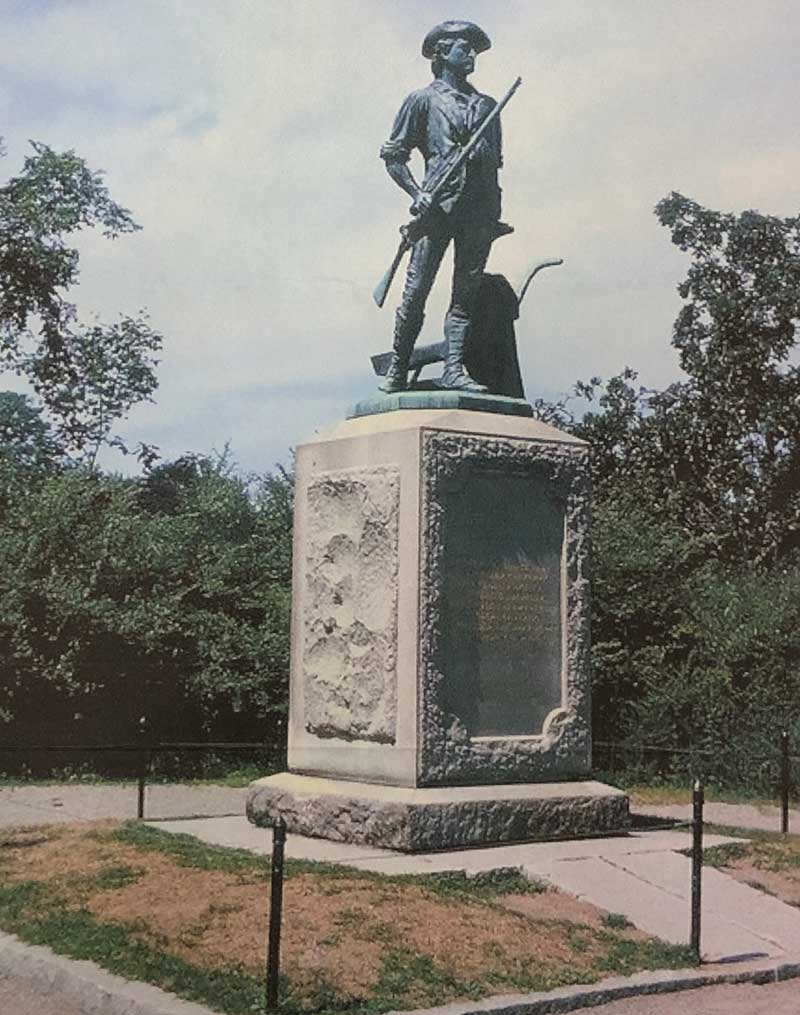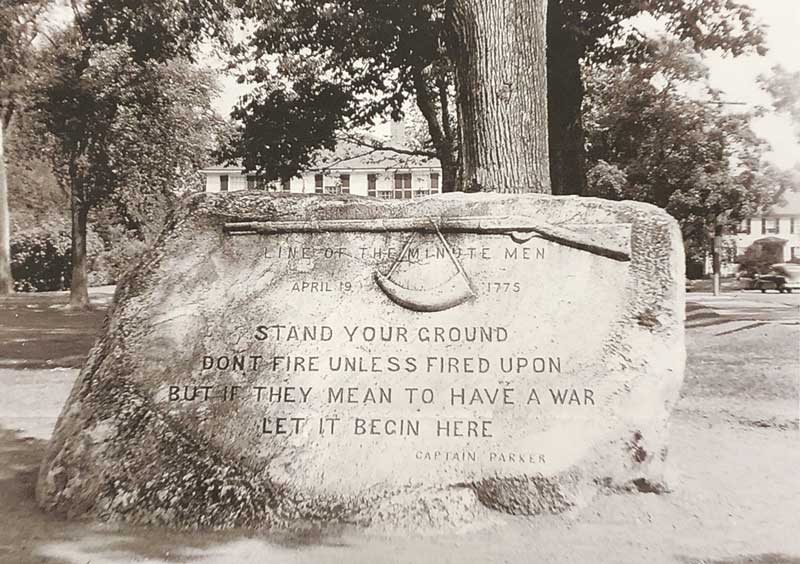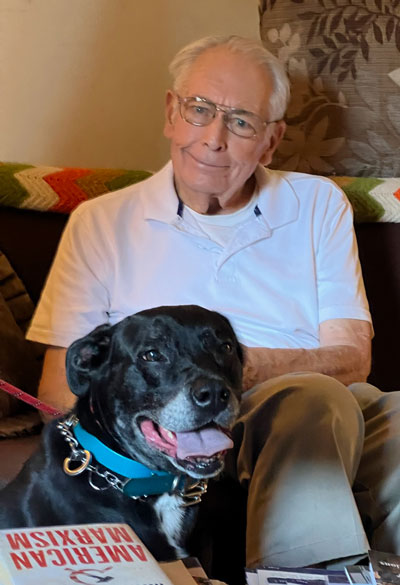
I’ve always loved Emerson’s famous “Concord Hymn”, the first stanza of which I’ve quoted above. It’s carved onto the famous “Minuteman Statue” that stands on one side of The Old North Bridge in Concord, Massachusetts. I’ve stood by this statue several times, read those verses from its pedestal, and walked across at least two reconstructed versions of that “Old North Bridge” over the years. But I’ve always believed that the “Minuteman” statue was erected in the wrong place—next to that Old North Bridge, rather than on the true birthplace of American freedom, the historic Battle Green in Lexington, Massachusetts, where the real first “shot heard ‘round the world” was fired, several hours before the battle at the Old North Bridge, both of which occurred on April 19, 1775.
I believe that mankind’s history is “His Story”, i.e. everything that happens in the timeline of human events is in God’s sovereign permissive or directive Will. And that included the events in a humble farming village called Lexington that occurred on the chilly and misty early morning of Wednesday, April 19, 1775, a date which should be commemorated by all Americans as Patriots’ Day, but sadly isn’t (except in liberal Massachusetts). Here is MY version of the events that Emerson so eloquently wrote about:
So what exactly did happen on that April morning? Part 1 of this article centered around a brave man, Lexington’s parson, Rev. Jonas Clark, and his resolve to protect his people from the exercise of increasingly harsh British authority by forming an armed militia from among his church members—a militia that could be used to resist representatives of his own government if they attempted to trample on the rights of free Englishmen (which is what all Americans considered themselves to be prior to April 19, 1775). On that cool and misty morning, Captain John Parker, a deacon from Rev. Clark’s church, The Lexington Congregational Assembly, who would succumb to tuberculosis the following September, stood with 77 of his fellow militiamen, facing a force of 700 British regulars, seasoned troops sent from Boston to teach those would–be rebels a lesson. That a “lesson” would be taught that day was inevitable, but as history recorded, the “students” became the “teachers”.
One of the fascinating tidbits of history is that in March of 1775, Jonathan Trumbal, the Royal Governor of Connecticut Province, set aside “A Day of Public Fasting and Prayer…that God would…pour out His Holy Spirit on us, to bring us to…repentance and effectual reformation;…That He would restore, preserve, and secure the liberties of this, and all the other American colonies….” The date he selected for that “Day of Fasting and Prayer” was Wednesday, April 19, 1775! From written recollections by actual participants of those events, we know that around 1:00 AM that morning, the alarm bell began to ring from the belfry on the village green. (This was a warning bell hung in an on-the-ground freestanding structure on the edge of the village green, not in their church’s steeple). Within minutes, the muster drums began to beat, and soon about 130 militiamen, led by Deacon Parker, their Captain, gathered on the green near Pastor Clark’s church. An armed Pastor Clark was there on the green along with his armed church members, accompanied by John Hancock and Sam Adams. However, the warning was premature, as the British regulars failed to show up; therefore Captain Parker dismissed his men with orders to reassemble if they again heard the alarm bell.
We’ve learned from history (I hope) that previously two signal lanterns were hung from the steeple of the North Church in Boston, telling those messengers waiting across the harbor that the British regulars were on the march, crossing “by sea” (across the bay) to the Charlestown shore. (One of those signal lanterns still exists—I’ve seen it in the Concord Historical Society Museum—and I’ve been almost to the top of the steeple in “Old North Church” where those two lanterns were used to signal—but we weren’t allowed to go up the steep and narrow stairway into the actual steeple, which is not the original steeple that was destroyed by a hurricane long ago—but we went up into the all original “bell ringer’s gallery”, where the teenaged Paul Revere used to pull the bell ropes for Old North Church.) At least three “alarm messengers”, including Paul Revere (there may have been more), were dispatched to spread the warning to every “village and farm” that the British military were coming to begin the process of disarming the free people of the Province. Revere got through the military blockades and accomplished his mission to warn Lexington and Pastor Clark (especially Hancock and Adams) before being captured by a British patrol on his way to Concord, a spot that is now marked by a historical road sign that I’ve read several times.
By then, the entire village knew that they were in mortal danger. Six companies of British Light Infantry, led by Major John Pitcairn, were coming to capture two bridges and seize the powder and shot and muskets stored in the armory in Concord. But first, the British realized they would have to pacify Lexington, which was turning into a “hornets nest” of anger and resistance to British arrogance. Adams and Hancock left the village after the first false alarm. When it became apparent that Lexington was the first target of the British force, the alarm bell was sounded again, but only 77 militiamen were close enough to hear this second alarm.

As the sun arose, a battle line of determined militiamen spread themselves across the green (I’ve stood on the exact spot several times). Captain Parker was much later reported to have exclaimed to his men: “Stand your ground. Don’t fire unless fired upon. But if they mean to have a war, let it begin here!” Can you imagine? A group of Christian patriots being led by their church’s Deacon and instructed by their pastor to resist tyranny—to “OBEY GOD RATHER THAN MAN”! It boggles my mind to picture a scene that would be difficult to imagine unfolding today in a similar manner: Determined Christians actually standing up against tyranny and opposing it, possibly with their own lives! As the British force marched up “Battle Road” (I drove on it) toward the village green, they stopped opposite Buckman’s Tavern (in which I’ve been several times), the traditional meeting place for the Lexington Militia (the Lexington “training band”, or Minutemen). That building is a few hundred feet from the “battle line”, whereon Parker’s militia were standing and waiting. Seeing the Patriot militia only a few hundred feet ahead, Major Pitcairn shouted: “Disperse you villains! Disperse, you damned rebels! Lay down your arms in the name of King George, Sovereign King of England.”
The response from the militia of Lexington (which was yelled by either Pastor Clark or by Captain Parker, depending on the source material), was: “We recognize no sovereign but God and no King but Jesus!” Now, I’ve stood on several occasions on that green, just where “the embattled farmers stood” as they beheld the intimidating British force massed in front of them. Without any doubt, it must have taken great courage to face down troops who were believed to be the best military in the world at that time. As to who actually fired “the first shot”, there is much conflicting testimony. One British soldier later testified that “the rebels” had fired at them first. At least one man of Lexington claimed to have stood inside the door of Buckman’s Tavern and fired the first shot at a British officer. Interestingly, there is a musket ball hole in the now sealed in clear plastic, old (and now removed) front door of this building, which could have resulted from return fire by the British regulars.
The best testimony is from Rev. Jonas Clark himself, who later claimed that the British had fired the first shot, and I believe him. Captain Parker then attempted to dismiss his militiamen after the order to disperse by Major Pitcairn, but by then it was too late—Americans had fired upon the British soldiers and hostilities had begun, which would not officially end until 1783 (and in truth not until 1814). Eight patriot militiamen were killed and ten wounded. But Captain Parker ordered his men to retain their weapons, all of which would be put to good use later that same day, because all of the British regulars were soon forced to retreat back to Boston after the Battle of the North Bridge that occurred a few hours later, suffering hundreds of killed and wounded, as the now aroused “American Patriots” from nearby areas heard of the events on Lexington’s Green and responded to the calls to resist enemy aggression. As we know, the British troops were attacked mercilessly from behind stone walls and trees as they eventually began their desperate march from Concord back to Boston. The American War of the Revolution had begun!
Time was not kind to the brave Deacon, Captain John Parker, who never saw the day of victory at Yorktown in 1781, dying of tuberculosis in September of 1775. Patriot Pastor Jonas Clark lived until 1805, serving his LORD and Savior to the end. Both are buried near each other in the Old Burial Ground just outside of Lexington. I’ve stood beside their graves and thanked God for having sent such men to serve as good examples for those who came after them.
What lessons should we who are alive today learn from the noble examples of fellow Christian believers who confronted their “moment of destiny” 244 years ago? For one, it has been my long-held belief that were it not for many of the churches in our original 13 Colonies, and especially for the pastors of “The Black Regiment”, we would, in all probability, be a member of the British Commonwealth today, bowing to the Queen and fawning over her unimpressive “royal” family. The Battles of Lexington and Concord should remind Christians and patriots of our time that there are those who pretend to be our rulers, and who want to conceal the critical roles that Christians, churches, and many pastors (and some Jewish rabbis) played in the birth of this noble experiment in self-rule that we call the U.S.A.
The cretins of the left—those despisers of limited government and worshippers of big and all-powerful and INTIMIDATING government—would like Americans to forget that it was mostly CHRISTIANS who died fighting for our original independence from Great Britain, and that many of the New England “Minuteman” groups were organized and based in their local churches. Historical revisionism is rampant in our troubled land. Our history is in the constant process of being “massaged and revised” to reflect the current “politically correct” nonsense that the people who sacrificed, bled, lost everything including homes, wealth, family, health, and their lives to give us the liberty most of us have long enjoyed, were nothing more than “old white men”, nasty “racists” who delighted in owning and torturing their slaves (which the great majority in ALL of the colonies NEVER owned), corrupt colonialists who persecuted the “noble savages” that originally inhabited America, and stole all their land; people who relished keeping women and minorities enslaved to their wills as second-class people. Our children and our millennial generation are being turned into ignorant cynics—into unthinking “global citizens”—by their schools and their peers, by the progressive dominated “social” media and by the mostly corrupt left-wing “main stream” media, because they are and were taught that American history has been invariably bad and sordid, and have been and are being denied exposure to the truths that in the vast majority of our history, in our America—from 1607 to this very moment—the GOOD has always eventually overcome the BAD.
The patriotic men and women who sacrificed throughout the Northeast and especially the South, during our First War for Independence (The War of the Revolution), still testify to the righteousness of their cause and the worthiness of their sacrifices. Let us all, as Christians and as Americans, pray and work so that these lessons of history will not be forgotten or, even worse, ignored. As one of my greatest heroes, the honorable Robert E. Lee reminded all of us, “It is history that teaches us to hope”. But if we lose the history, we will ALL lose that hope, and the sacrifices of those who have lived and died before us to make and maintain a humane and God-honoring land, as imperfect as it was then, is now, and will always be, will have been IN VAIN. That choice always looms before us, and it forces those of us alive today to choose what kind of future our descendants will have-- one that allows them to exist in freedom, or one that mandates that they suffer in tyranny! May we choose “wisely”!














